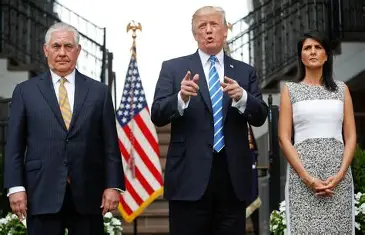October 18, 2025 | Washington, D.C.
President Donald Trump has authorized a sweeping expansion of U.S. military and intelligence operations against Venezuela, marking one of the most forceful American interventions in Latin America in recent decades. The effort includes targeted U.S. Navy strikes on suspected drug-smuggling vessels, intelligence missions across the Caribbean, and expanded covert operations conducted by the Central Intelligence Agency.
According to U.S. defense officials, recent naval operations have destroyed several boats believed to be trafficking narcotics from Venezuelan waters, resulting in multiple casualties and arrests. The Pentagon described the campaign as part of a broader operation to dismantle transnational criminal networks that allegedly operate under the protection of Venezuelan state actors. Trump confirmed that he personally approved the missions, calling them a “decisive blow against narcoterrorism” and “a warning to regimes that profit from the drug trade.”
Senior U.S. officials have revealed that CIA units are now engaged in operations inside Venezuela, conducting intelligence gathering, sabotage of smuggling infrastructure, and collaboration with informants opposed to President Nicolás Maduro. Washington accuses the Venezuelan government of facilitating large-scale narcotics trafficking and money laundering operations through its state-run enterprises. The White House says these measures are necessary to protect U.S. security and regional stability.
Venezuela’s government condemned the actions as “acts of war” and accused Washington of violating international law. The Maduro administration said it has placed its armed forces on high alert and ordered the mobilization of coastal defense units to deter further U.S. incursions. “We will defend every inch of Venezuelan territory,” the country’s defense minister declared in a televised statement from Caracas.
International reaction to the escalation has been mixed. Colombia and Brazil have urged restraint, warning that expanding the conflict could destabilize the entire Caribbean region. Russia and China, both long-standing allies of Venezuela, have criticized the U.S. military operations, describing them as unlawful and provocative. Moscow announced it will send defense advisers to assist Venezuelan military forces in strengthening coastal surveillance.
Legal experts and human rights organizations have raised concerns over the legality of the operations, citing possible violations of maritime law and the War Powers Resolution. Humanitarian groups have also questioned the treatment of detained smugglers held aboard U.S. naval vessels, calling for independent monitoring and due process guarantees. The Pentagon insists that the missions comply with international norms and that detainees are being treated in accordance with U.S. law.
In Congress, lawmakers from both parties have requested classified briefings on the scope of CIA involvement and the potential for escalation. While administration officials have defended the actions as necessary, some legislators warn that the situation could spiral into a prolonged regional conflict if not managed carefully. Analysts say the operations reflect a broader U.S. strategy of projecting power across the Western Hemisphere to counter rival influences and secure maritime trade routes.
The renewed U.S. offensive also follows an increase in narcotics seizures across the Caribbean, which intelligence agencies attribute to tightened military surveillance. Defense analysts predict that Washington may soon impose additional sanctions targeting Venezuela’s state-owned oil company and senior military figures linked to trafficking operations.
The situation remains fluid as both countries prepare for possible further confrontations. Diplomatic efforts by regional organizations, including the Organization of American States, have so far failed to reduce tensions. Observers warn that without dialogue, the U.S.-Venezuela standoff could deepen, potentially drawing in other powers and reshaping security dynamics in the Americas.



